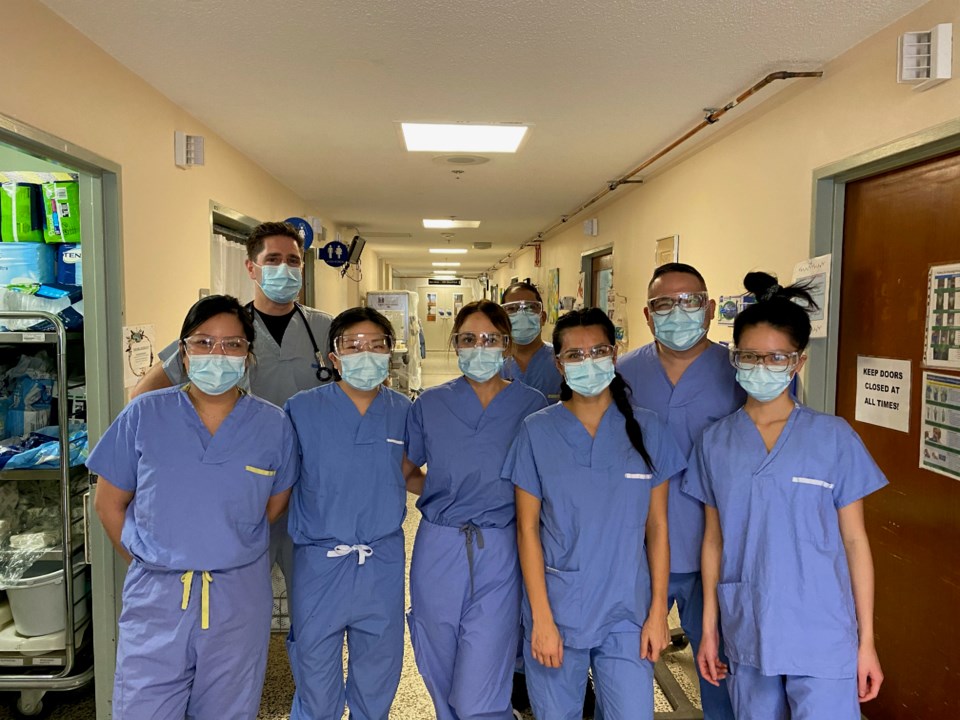McLeod was one of the doctors involved in hurriedly setting up the ward when the pandemic arrived back in the spring. Since then, he’s been one of a rotation of local doctors who’ve been fighting an enemy none understood when the call to action was suddenly thrust upon them.
Their understanding of the virus has changed dramatically in the time since.
In the early days of the virus, so much of the talk was about “do we have enough ventilators?” McLeod recalls. Since then, thinking has changed. While some COVID-19 patients do require help to breathe from a ventilator, many people do better if that move is delayed as long as possible, he said. “People do better when we keep them out of the intensive care unit.”
In the early days of the pandemic, there were no effective treatments doctors could offer patients. Thankfully that’s also improved, said McLeod.
“Now we actually do have some therapeutic interventions that are very simple. One of the simplest things is just giving people steroids, which dampens down the immune response” and keeps some of the worst complications of the virus at bay, he said. “It’s a 10-cent drug that can really make a big difference for people who are sick in the hospitals.”
Patients can worsen quickly
But COVID-19 remains a confounding virus in many ways. Patients’ conditions can worsen very quickly and unexpectedly, McLeod has learned.
“I have been surprised by people who seem to be OK and 12 to 24 hours later they’re dead,” he said. That’s something that’s different from other respiratory illnesses like pneumonia or even bad cases of the flu. With those, people tend to “grumble along” fighting the virus, he said. “But with this, you get to the edge of the cliff and you fall off and very quickly hit the bottom.”
Some of his worst moments have been with dying patients, when family members can only have a short final visit, swathed in goggles and protective equipment. “It’s not how anyone expects to go or have loved ones go,” he said.
While the typical COVID-19 patients he sees are in their 70s and 80s, there are also younger people who contract the virus and are left with lasting impacts. McLeod points to busy young moms in their 40s who could handily run several kilometres previously but feel out of breath climbing a flight of stairs three months after recovering from COVID-19.
“We don’t seem to understand why some people have these ongoing symptoms. But it’s a very legitimate phenomenon,” he said.
McLeod admits he’s been surprised by how quickly and easily something else has spread during the pandemic – misinformation about the virus. He’s read comments on social media made by people who think the virus is a hoax or that the vaccine will be loaded with a government tracking device. “You hear things that just don’t make sense,” he said.
Frustration with COVID-19 rule-breakers
As a doctor who works with COVID-19 patients in hospital, McLeod said he gets frustrated by the sense of entitlement some people have – that they don’t need to observe the rules set down for everyone else.
“The problem when you have some people following [the rules], and some not, well, then you still have this [virus] spreading, and then what happens is there’s more and more rules,” he said. “So the people who are following the rules are being squeezed more and more, but the people who are subverting them are the reason why we have stricter and stricter rules.”
McLeod is hopeful that the vaccine now being rolled out in B.C. is going to be a game changer.
“Health-care workers are extremely excited,” he said. “If you [vaccinate] the very high-risk people, the people in care homes where we’ve seen 80 per cent of deaths happen, we’re going to see a dramatic drop in the number of deaths,” he said – even before the shot makes it into the more general population.
“A vaccine has a huge, huge positive impact.”




